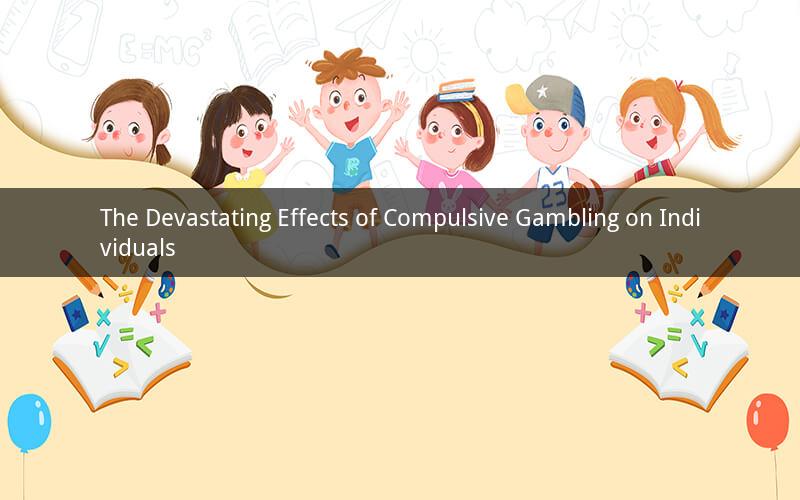
Compulsive gambling, often referred to as gambling addiction, is a condition that can have severe consequences on an individual's life. It affects not only the gambler but also their family, friends, and finances. This article delves into the various ways in which compulsive gambling can impact a person's life, including mental, emotional, and financial consequences.
Mental Health Consequences
One of the most significant impacts of compulsive gambling is on an individual's mental health. Compulsive gamblers often experience feelings of guilt, shame, and despair. They may also develop anxiety, depression, and other mental health issues as a result of their addiction.
1. How does compulsive gambling lead to mental health issues?
Compulsive gambling can lead to mental health issues due to the intense stress and anxiety it causes. The constant need to gamble and the fear of losing everything can lead to feelings of guilt and shame, which can exacerbate mental health problems.
2. Can compulsive gambling trigger a mental breakdown?
Yes, compulsive gambling can trigger a mental breakdown. The stress and anxiety associated with the addiction can overwhelm an individual, leading to a complete breakdown of their mental health.
3. How can compulsive gambling affect a person's self-esteem?
Compulsive gambling can significantly impact a person's self-esteem. The constant need to gamble and the fear of losing everything can lead to feelings of inadequacy and worthlessness.
4. What are some common mental health issues associated with compulsive gambling?
Common mental health issues associated with compulsive gambling include anxiety, depression, and substance abuse. These issues can further exacerbate the individual's addiction and make it more difficult to overcome.
Emotional Consequences
In addition to mental health issues, compulsive gambling can also have a significant impact on an individual's emotional well-being. The addiction can strain relationships, cause emotional turmoil, and lead to feelings of isolation and despair.
1. How does compulsive gambling affect family relationships?
Compulsive gambling can strain family relationships. The individual's addiction may lead to financial problems, which can cause arguments and conflict within the family. The gambler may also become distant and uncommunicative, leading to feelings of isolation and rejection.
2. Can compulsive gambling lead to emotional breakdowns?
Yes, compulsive gambling can lead to emotional breakdowns. The stress and anxiety associated with the addiction can cause intense emotional turmoil, leading to breakdowns in communication and trust.
3. How can compulsive gambling affect a person's social life?
Compulsive gambling can significantly impact a person's social life. The individual may become obsessed with gambling, leading to neglect of their relationships and social obligations.
4. What are some emotional consequences of compulsive gambling?
Some emotional consequences of compulsive gambling include feelings of guilt, shame, despair, and isolation. These emotions can further exacerbate the individual's addiction and make it more difficult to seek help.
Financial Consequences
Compulsive gambling can also have severe financial consequences. Individuals who are addicted to gambling may spend all of their money on gambling, leading to financial ruin and bankruptcy.
1. How does compulsive gambling lead to financial problems?
Compulsive gambling can lead to financial problems as the individual spends all of their money on gambling. This can lead to missed payments, debt, and bankruptcy.
2. Can compulsive gambling cause bankruptcy?
Yes, compulsive gambling can cause bankruptcy. The individual's addiction may lead to massive debt, which can become overwhelming and lead to bankruptcy.
3. How can compulsive gambling affect a person's credit score?
Compulsive gambling can significantly impact a person's credit score. The individual's debt and missed payments can lead to a lower credit score, making it more difficult to obtain loans and credit in the future.
4. What are some long-term financial consequences of compulsive gambling?
Long-term financial consequences of compulsive gambling include debt, bankruptcy, and a lower credit score. These consequences can have a lasting impact on the individual's financial well-being and future opportunities.
Conclusion
Compulsive gambling is a devastating addiction that can have severe consequences on an individual's life. It affects mental, emotional, and financial well-being, leading to feelings of guilt, shame, and despair. It is crucial for individuals struggling with compulsive gambling to seek help and support to overcome their addiction and rebuild their lives.
Questions and Answers:
1. Q: Can compulsive gambling lead to physical health issues?
A: Yes, compulsive gambling can lead to physical health issues. The stress and anxiety associated with the addiction can cause headaches, insomnia, and other physical symptoms.
2. Q: How can friends and family support someone struggling with compulsive gambling?
A: Friends and family can support someone struggling with compulsive gambling by offering empathy, understanding, and encouragement. They can also help the individual seek professional help and provide a stable support system.
3. Q: Are there any treatment options available for compulsive gambling?
A: Yes, there are several treatment options available for compulsive gambling, including therapy, support groups, and medication. The most effective treatment plan may vary depending on the individual's needs.
4. Q: Can compulsive gambling be cured?
A: Compulsive gambling is a chronic condition, but it can be managed and controlled with the right treatment and support. While a cure may not be possible, individuals can learn to live with their addiction and lead fulfilling lives.
5. Q: How can I recognize the signs of compulsive gambling in myself or someone else?
A: Signs of compulsive gambling include a preoccupation with gambling, hiding gambling activities, borrowing money to gamble, and lying about gambling habits. If you or someone you know exhibits these signs, it is important to seek help.